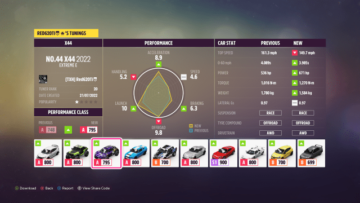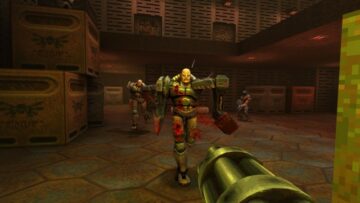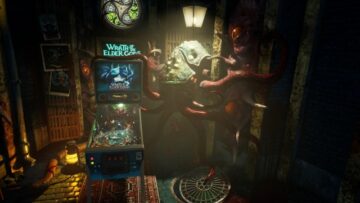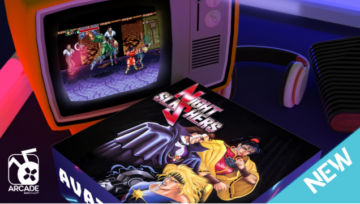There should be a word in the English language for games like Born of Bread. It’s so much easier to catalogue its flaws – and by golly it has a bread bin full of them – than it is to capture its joys. But it manages to be so endearing that we spent most of our time excusing its issues. We had a similar response to Ravenlok. What do you call that? ‘Affection through adversity’? ‘Warts and all’? None of them really do the job.
Born of Bread certainly doesn’t look flawed. It’s got that vogueish 2.5D thing going on. Not quite as dazzling a use of the graphical style as in Octopath Traveler, but it really pops. The world is as temptingly explorable as the best 3D platformers, while the characters have the exaggerated expressions of a top-drawer Cartoon Network offering. We could absolutely see Born of Bread getting a Cuphead-like Netflix series, and it would deserve it.


The tone is set to whimsy, but not in the vaguely annoying, self-aware way. When Loaf is born, as an accidental manifestation from a magical recipe, the game largely forgets what Loaf is made of. Everyone accepts him and moves on. There’s an underlying warmth to it all: each of the characters in Born of Bread is undergoing some personal growth (yeast will do that), and you’re helping them along. It’s probably key to the affection we have for it – it’s got the good-natured spirit that you’d want from a game releasing over Christmas.
What it isn’t is funny. That surprised us. It’s not that it aims for laughs and misses – it’s not cringeworthy in that way – but it’s happy to stay in the realm of ‘good to be around’. Personally, it’s a shame it doesn’t have full-blown laughs in its locker. If it was sharper, a little more abstract perhaps, then it would have been a pure delight. I don’t think I would have been here talking about the balance between its positives and negatives.
We should probably note what kind of game this is. Born of Bread is in the same vein as Costume Quest, Rainbow Billy and Adventure Time: Pirates of the Enchiridion. It’s an attempt to bring the ATB combat of a Final Fantasy to a broader range of players. And when it’s not in combat, it’s an explorathon and fetch quest simulator, as you travel its many regions completing side missions and leveling up your characters.
The big bad that you’re here to stop is Jester. He’s been awakened from a centuries-long stasis alongside his group of mates. They’re none to happy that their beloved Empire has been erased and replaced by peace-loving races, so they’re collecting magical Sunstones in an effort to cast a spell that would overwrite this world. You get wind of this, join the ‘Savers Guild’ (a kind of adventurer’s guild dedicated to recording their quests) and form a band to stop them.
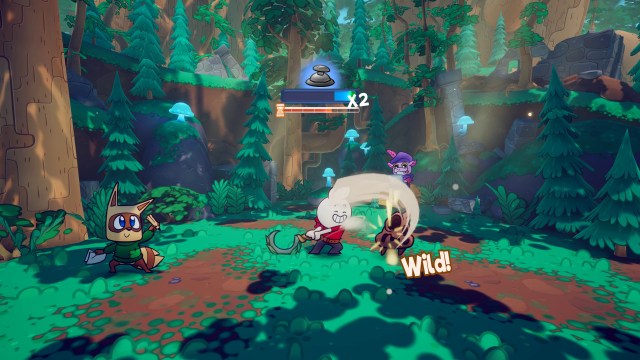

Inevitably, each Sunstone is in a different region (a pirate land, an ice land, a forest land etc) where the structure is roughly the same. You arrive, beat up some new baddies, find the area’s town, find out the town’s bigger problem, beat up some more baddies, then resolve that bigger problem. Sprinkled in between are some opportunities to quest: you can bring messages to villagers, race against sprinty types and find hidden salamanders in the environment.
But while it is a formula, it doesn’t feel like one. There we go: maybe that’s the secret sauce that makes Born of Bread special. While the structure is pretty rigid, it finds distinctive ways to use it. A haunted mansion had us half-expecting to trip over Luigi, with more emphasis on exploring every nook and cranny, as well as backtracking (too much backtracking) to unlock previously closed doors. A more organic dungeon is a maze of tunnels and teleports. Born of Bread uses the same ingredients to make a wealth of different dishes. Bread is just so versatile, right?
It does lose something in the bake though. We’d have let it prove a little longer. There’s a fiddliness to playing Born of Bread that began to irk. Changing characters should be swift, as you can only have one out at a time and you need their different abilities to clear rocks and pull hooks in the environment. But it’s always a long fumble in the interfaces before you can get to them. The same goes for eating food to heal outside of combat, which is a myriad of button presses, and levelling up the characters is also a pain. The latter is made more problematic by weird design decisions: we’re still not entirely sure about the rules around who gets a point to spend and why.
Combat and its relation to progression is the biggest miss. Each weapon you use has a minigame attached, so a bow might have a dart target to aim at, while a pickaxe might be more timing based. It’s a nice additional thought, but the reality is that you will find something that works and then stick with it. All that variety and interest doesn’t get fully explored. There’s an elemental weakness chart at play, Pokemon-style, but we got the impression the designers got bored or realised younger players couldn’t handle it so half-forgot about it. Weaknesses are very minor, aren’t well signposted, and mostly don’t apply to hits you receive. We ended up using the same Ember Halberd for about half of Born of Bread.
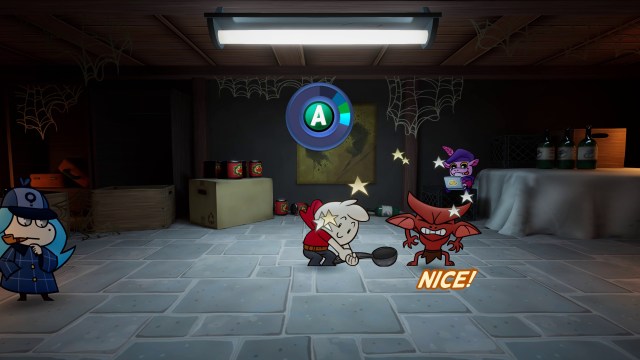

It’s not that Born of Bread doesn’t have ideas in this area, it just never fully commits to them. There’s a social media thing going on, as you get prompts from your followers to do certain things. ‘Use an item!’, they will say, and you’ll get extra WP (the game’s mana) for satisfying them. But the prize is so small, and takes a few turns to trigger. Most of the time, we’d killed the enemy before we got the payoff (thanks Ember Halberd).
One idea we did like was how Born of Bread dealt with defensive stances. Games like this really struggle to make defending sexy and useful: why defend when offense is likely the best defense? Successfully defending in Born of Bread means you generate WP and can do more powerful attacks.
But being Born of Bread, it underbakes this too. We found our allies to be so ineffective that they were barely worth using to generate damage. They have the most pathetic little skill trees to pad out, and the power of each attack stays roughly the same throughout the game. So, we ended up using them as meat shields, defending while they had life points, and generating action points for my bigger weapons. It wasn’t exactly empowering or exciting.
It’s all too easy to play these combat sections mindlessly, wishing there was an auto-battle option (Born of Bread at least has the self-awareness to joke about it). That’s because there’s not much challenge here, which makes sense for a family-friendly offering. But it hits everything. There’s very little depth to customising your character, changing their build (although there is a fun Tetris-like approach to slotting in weapons), leveling up, or changing combat approaches. In fact, you will be doing the same ballpark amounts of damage to enemies (which have similar health pools) from the beginning of the game to the end. Your character’s progression is a flatline.
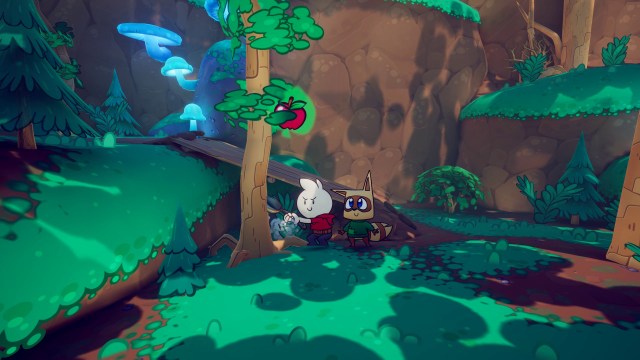

But but but. We keep excusing Born of Bread because it’s so easy to excuse. While it’s not challenging, it’s both accessible and almost impossible to get stuck. You’re always barrelling onto the next quirky situation. While it’s got no progression to speak of, there’s still loads to collect. The urge to complete side-quests is still there. Humming in the background is some gorgeous art and a revolving door of engaging characters.
We’re glad that reviews aren’t debates. It would be so easy to argue, objectively, why Born of Bread isn’t a 4 out of 5 game. Its interfaces, combat and progress are so raw that you can taste the dough. The thing is, there’s a magical alchemy in the bake that means Born of Bread rises above these issues. It should be weighed down by them, but, somehow, it emerges as a light, fluffy RPG all the same. Costume Quest fans – you have a new game to play.
- SEO Powered Content & PR Distribution. Get Amplified Today.
- PlatoData.Network Vertical Generative Ai. Empower Yourself. Access Here.
- PlatoAiStream. Web3 Intelligence. Knowledge Amplified. Access Here.
- PlatoESG. Carbon, CleanTech, Energy, Environment, Solar, Waste Management. Access Here.
- PlatoHealth. Biotech and Clinical Trials Intelligence. Access Here.
- Source: https://www.thexboxhub.com/born-of-bread-review/
- 1
- 360
- 3d
- a
- abilities
- About
- above
- absolutely
- ABSTRACT
- accepts
- accessible
- accidental
- Action
- Additional
- Adventure
- Against
- AI
- aim
- aims
- Alchemy
- All
- almost
- along
- alongside
- also
- Although
- always
- amounts
- an
- and
- apply
- approaches
- ARE
- AREA
- argue
- around
- Art
- as
- At
- attack
- attacks
- attempt
- background
- bad
- balance
- band
- based
- BE
- beat
- because
- been
- before
- began
- beginning
- being
- beloved
- BEST
- between
- BIG
- bigger
- Biggest
- BIN
- Bit
- bored
- born
- both
- Bread
- bring
- broader
- build
- but
- button
- by
- call
- CAN
- capture
- cartoon
- Cartoon Network
- certain
- certainly
- challenge
- challenging
- changing
- character
- characters
- chart
- Christmas
- clear
- closed
- collect
- Collecting
- combat
- complete
- completing
- content
- could
- damage
- dealt
- debates
- decisions
- dedicated
- Defense
- defensive
- delight
- depth
- Design
- designers
- DID
- different
- distinctive
- do
- does
- doing
- door
- doors
- down
- each
- easier
- easy
- effort
- emerges
- emphasis
- empire
- empowering
- end
- ended
- engaging
- English
- entirely
- Environment
- etc
- Every
- everyone
- everything
- exactly
- Exciting
- explored
- Exploring
- expressions
- extra
- fact
- fans
- FANTASY
- feel
- few
- Final
- Final Fantasy
- find
- finds
- flawed
- flaws
- followers
- food
- For
- forest
- form
- formula
- found
- from
- full
- fully
- fun
- funny
- game
- Games
- Games Like
- generate
- Generating
- Get
- gets
- getting
- go
- goes
- going
- got
- Group
- Growth
- Guild
- had
- half
- handle
- happy
- has
- Have
- Health
- helping
- here
- hidden
- High
- him
- his
- hits
- hooks
- How
- HTTPS
- i
- ICE
- idea
- ideas
- if
- impossible
- in
- interest
- interfaces
- Is
- issues
- IT
- ITS
- Job
- join
- joys
- jpg
- just
- keep
- Key
- kind
- Land
- language
- largely
- least
- let
- Life
- light
- like
- likely
- Little
- loads
- Long
- longer
- Look
- lose
- Luigi
- made
- make
- MAKES
- mansion
- many
- maybe
- means
- Meat
- Media
- messages
- might
- minor
- miss
- misses
- missions
- more
- most
- mostly
- much
- my
- myriad
- need
- negatives
- Netflix
- network
- never
- New
- Next
- Nice
- no
- None
- not
- note
- objectively
- of
- offense
- offering
- on
- One
- only
- onto
- opportunities
- Option
- or
- Organic
- our
- out
- outside
- over
- pad
- Pain
- perhaps
- personal
- personally
- pirate
- Pirates
- plato
- plato data intelligence
- platodata
- platogaming
- play
- players
- Playing
- Point
- Points
- Pools
- power
- powerful
- pretty
- previously
- prize
- probably
- Problem
- Progress
- progression
- prompts
- prove
- quest
- quests
- quite
- Race
- races
- range
- Raw
- Reality
- really
- realm
- receive
- recipe
- recording
- region
- regions
- relation
- releasing
- Resolve
- response
- review
- Reviews
- right
- rigid
- roughly
- RPG
- rules
- same
- satisfying
- say
- Secret
- see
- Self-Awareness
- sense
- Series
- set
- should
- side
- similar
- simulator
- situation
- skill
- small
- So
- Social
- social media
- some
- somehow
- something
- speak
- special
- spend
- spirit
- sprinkled
- stay
- still
- stop
- structure
- struggle
- style
- successfully
- sure
- SWIFT
- takes
- talking
- Target
- taste
- than
- thanks
- that
- The
- The Game
- the world
- their
- Them
- then
- there
- These
- they
- thing
- things
- think
- this
- though
- thought
- Through
- Throughout
- time
- timing
- to
- tone
- too
- town
- travel
- trees
- trigger
- trip
- turns
- types
- undergoing
- underlying
- unlock
- up
- us
- use
- uses
- using
- variety
- versatile
- very
- want
- was
- way
- ways
- we
- weakness
- Wealth
- weapons
- well
- were
- What
- when
- where
- while
- WHO
- why
- wild
- will
- wind
- wishing
- with
- works
- world
- worth
- would
- you
- your
- zephyrnet


